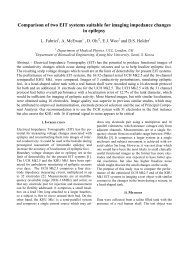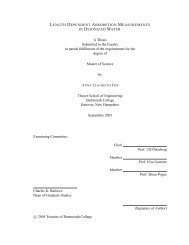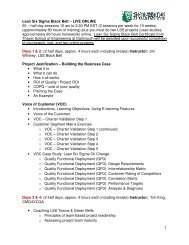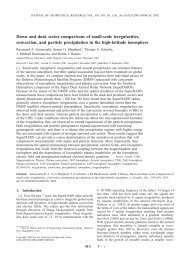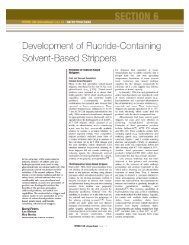Courses Programs - Thayer School of Engineering - Dartmouth ...
Courses Programs - Thayer School of Engineering - Dartmouth ...
Courses Programs - Thayer School of Engineering - Dartmouth ...
You also want an ePaper? Increase the reach of your titles
YUMPU automatically turns print PDFs into web optimized ePapers that Google loves.
graduate courses<br />
116<br />
Management <strong>Courses</strong><br />
(Tuck <strong>School</strong> <strong>of</strong> Business)<br />
The following Tuck electives are available to M.E.M. students. All courses require<br />
permission from the instructor and prior approval <strong>of</strong> the M.E.M. program director.<br />
For a complete listing <strong>of</strong> Tuck management courses, see:<br />
tuck.dartmouth.edu/mba/academics/<br />
Corporate Valuation<br />
Offered: W11<br />
Students will have an opportunity to estimate cash flows and discount rates in order<br />
to establish values for projects and firms. In addition to traditional discounted cash<br />
flow (DCF) analysis, the course explores alternative valuation methods, such as real<br />
option valuation and comparable company analysis. The contribution <strong>of</strong> corporate<br />
financial decisions regarding capital structure, cash distribution policies, and performance<br />
evaluation schemes to value creation and destruction are also investigated.<br />
The course will use a mixture <strong>of</strong> lectures, cases, projects, and guest speakers.<br />
Prerequisite: ENGM 180<br />
Instructor: Sundaram<br />
Advanced Competitive Strategy<br />
Offered: F10<br />
This course is designed to analyze the strategic lessons learned from the fields <strong>of</strong><br />
military science, political science, international relations, and history, especially <strong>of</strong><br />
the history <strong>of</strong> world empires from Ancient Rome to the British and even modern<br />
America. Applying these lessons to business, this course examines when and where<br />
to use guerilla versus traditional war fighting strategies, defensive versus <strong>of</strong>fensive<br />
strategic postures, brinkmanship versus cooperative strategies, and revolutionary<br />
versus counterrevolutionary strategies. Part <strong>of</strong> the course is devoted to the use <strong>of</strong><br />
portfolio strategy as a competitive weapon to create mutual assured destruction, to<br />
shift the balance <strong>of</strong> market power between competitors, and to create the conditions<br />
for pr<strong>of</strong>itability and stability by guiding the evolution <strong>of</strong> industry structure. To apply<br />
these concepts to business, the course develops visual tools such as price-quality<br />
analysis, stronghold analysis, know-how and smart-bombing analysis, as well as<br />
competitive pressure mapping and sphere-<strong>of</strong>-influence analysis. The course is<br />
designed to provide an alternative to traditional economic and strategic planning<br />
frameworks, sometimes presenting a contradictory viewpoint.<br />
Instructor: D’Aveni<br />
Medical Care and the Corporation<br />
Offered: F10<br />
Employer-sponsored healthcare plays a significant role in the US health system. From<br />
the standpoint <strong>of</strong> business leaders, healthcare plays a critical role in the viability and<br />
success <strong>of</strong> a business. This course will focus on the structure and dynamics <strong>of</strong> the<br />
healthcare system from the perspective <strong>of</strong> corporate leaders as both payors <strong>of</strong> care<br />
and trustees <strong>of</strong> healthcare organizations. Through the course, students will understand<br />
the importance <strong>of</strong> business executive's role in improving healthcare as a business<br />
and social imperative. The course is intended to 1) demonstrate how all corporate<br />
leaders can exercise judgment and control over expenditures for healthcare benefits<br />
while protecting the health <strong>of</strong> their employees 2) enhance the ability <strong>of</strong> all Tuck<br />
graduates to serve as Trustees <strong>of</strong> healthcare organizations, e.g., hospitals, physician<br />
group networks, insurers and purchasing collaboratives and 3) reinforce the applicability<br />
<strong>of</strong> core management concepts and techniques when serving in either <strong>of</strong> these<br />
capacities: employer/payor or healthcare organization trustee.<br />
Instructors: Zubk<strong>of</strong>f, Gardent




